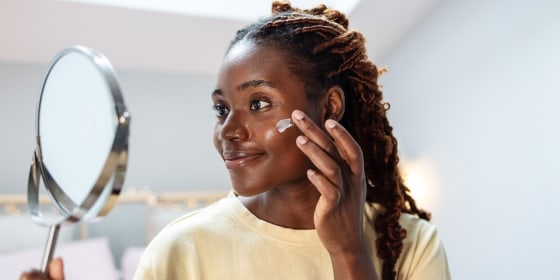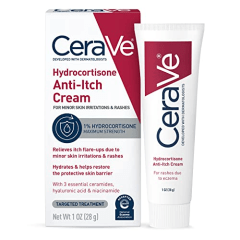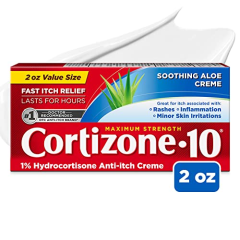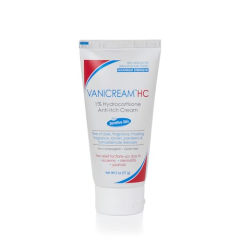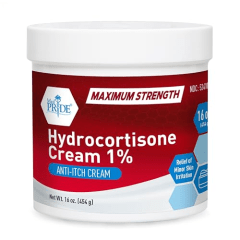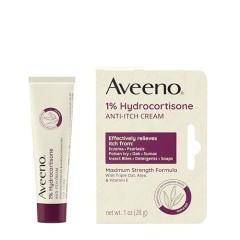We don’t always have the answers, but we have some people on speed dial who do — which is why we present to you our series FYI where we have experts explain if lip balm is actually bad, how often should you wash your hair and more.
That big zit? That itchy red patch? Yeah, we know you’d climb Everest just to get rid of them. And, as tempting as those DIY tips and tricks are (we’re looking at you lemon peels and egg whites), it’s not always safe to try. One of the more popular remedies touted on the internet? Using a topical steroid cream on your face — cortisone cream, to be specific — to reduce swelling and redness.
Though cortisone cream is intended to be used on your skin, it’s not necessarily formulated specifically for your face. So, is it safe to use there? And does it solve the aforementioned problems better than, say, a pimple patch or spot treatment? To find out, we spoke with two dermatologists. Below, they weigh in on why someone may want to apply cortisone cream to their face, who should avoid it and how to do it if you are down to try it.
SKIP AHEAD What is cortisone cream? | Is it safe to use cortisone cream on your face? | The benefits of using cortisone cream on your face | How to use cortisone cream on your face | Alternatives to cortisone cream | Why trust NBC Select?
What is cortisone cream?
Cortisone cream, or hydrocortisone, is a topical steroid most commonly used to reduce skin swelling, itching and redness. According to the experts we spoke to, these conditions are caused by contact dermatitis, bug bites or rashes.
Cortisone cream is available both over the counter and with a prescription. Without a prescription, the highest concentration you’ll likely be able to find is one percent. This should work on my minor irritations. A doctor may prescribe a higher concentration if you have a more severe issue.
Is it safe to use cortisone cream on your face?
Generally speaking, cortisone cream is safe to use on your face — at least briefly. “However, it’s really only recommended in certain circumstances, like if you’re dealing with eczema, seborrheic dermatitis, psoriasis on the face, allergic reaction or a big inflamed pimple,” says Dr. Viktoryia Kazlouskaya, a board-certified dermatologist and owner of Dermatology Circle in New York City.
Our experts shared that cortisone creams should only be used for a short time (no matter where you are using it) because prolonged usage can increase your risk of experiencing some not-so-great side effects — including thinning skin, easy bruising and even stretch marks. “The skin on the face absorbs steroids faster than other areas, making the risk of side effects significant when used for a long time,” says Kazlosukaya. “This may worsen acne and rosacea or even trigger new breakouts.” Thankfully, none of these side effects will likely appear with occasional use.
Though cortisone cream is considered safe to use on your face, some people may want to think twice before doing so. “If you have very sensitive skin or a condition like rosacea, cortisone creams may make things worse,” says Dr. Hannah Kopelman, a board-certified dermatologist and host of the Derm Club podcast. “It’s also important to avoid using cortisone if you suspect an infection, as it can suppress your skin’s ability to fight bacteria or fungi.”
The benefits of using cortisone cream on your face
Now that you know it’s safe, you may wonder why you’d want to use cortisone cream on your face. “It’s incredibly effective at reducing inflammation and irritation,” explains Kopelman. “Because of this, it can quickly calm down flare-ups for conditions like eczema, allergic reactions or certain rashes.” She adds that, for people with inflammatory skin conditions like acne, it can provide rapid relief from redness, swelling and itching.
Along with redness and inflammation, our experts shared that dabbing on the occasional glob of cortisone cream can help with the following common face issues:
- Allergic contact dermatitis (often from a bad reaction to a chemical or product)
- Sunburn
- Cold sores
- Breakouts
- Hyperpigmentation
How to use cortisone cream on your face
Want to try using cortisone cream on your complexion? “Low-potency cortisone creams, like over-the-counter hydrocortisone 1%, are the safest option for facial use,” says Kopelman. “You should avoid higher potency steroid creams unless specifically prescribed by your dermatologist.”
When spreading it on your face, dab it only on the impacted areas and be careful not to use too much. “Apply a very thin layer to the affected area once or twice a day for no more than a week, unless instructed otherwise by a dermatologist,” she adds.
“It’s important to keep in mind that cortisone cream really is not a skin care ingredient — it’s a medication and should be treated as such,” says Kazlouskaya.
Alternatives to cortisone cream
While cortisone cream can effectively fight redness, itchiness and inflammation, other ingredients are formulated specifically for your face that can address those issues. “For calming inflammation, I often recommend products with ingredients like niacinamide, colloidal oatmeal, or ceramides,” says Kopelman. “And if you need something stronger, calcineurin inhibitors like tacrolimus or pimecrolimus are prescription options that don’t carry the same risks as steroids.”
Experts previously told us that red light therapy is another option for reducing inflammation in your skin. Several devices on the market allow you to expose your face to red light, which works by producing wavelengths of light that penetrate your skin and cause positive reactions in your cells.
Whether it’s cortisone cream or something else, the smartest way to determine what will work best for your skin issue is to consult a dermatologist. A doctor will be able to consider your specific needs and come up with an effective treatment plan, says Kazlouskaya.
Meet our experts
At NBC Select, we work with experts with specialized knowledge and authority based on relevant training and experience. We also ensure all expert advice and recommendations are made independently and without undisclosed financial conflicts of interest.
- Dr. Viktoryia Kazlouskaya is a board-certified dermatologist and owner of Dermatology Circle in New York City.
- Dr. Hannah Kopelman is a dermatologist and host of the Derm Club podcast.
Why trust NBC Select?
Bethany Heitman is a contributor at NBC Select and a journalist who regularly covers beauty, home and lifestyle. For this story, she interviewed two dermatologists on using cortisone cream on your face.
Catch up on NBC Select’s in-depth coverage of tech and tools, wellness and more, and follow us on Facebook, Instagram, Twitter and TikTok to stay up to date.
